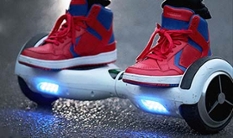Hoverboard Fire Safety

Learn about hoverboard associated injuries and fires.
UC San Diego bans the use, possession, charging, or storage of self-balancing, battery-powered boards, known as hoverboards, sometimes referred to as electronic skateboards or scooters, and other similar equipment at buildings and housing units at all University locations including medical centers.
This ban is only applicable to those devices that meet the definition of a hoverboard. It does NOT include non-self-balancing electric skateboards, eBikes, or electronic mobility devices for people with disabilities. These devices use different types of batteries that are not known to pose a risk of catching fire while charging or in use. Hoverboard models that are tested and certified by an accredited third party testing laboratory (such as the Underwriters Laboratory) are excluded from this ban. The testing and certification must be performed against a recognized performance standard that has specifically evaluated the fire safety of the device.
The Chairman of the U.S. Consumer Product Safety Commission (CPSC), Elliot F. Kaye, issued a statement on December 16, 2015 indicating that some hoverboards caught fire while charging, while others caught fire while in use. In light of numerous reports of unexpected and spontaneous fires caused by hoverboard batteries, the University of California prohibits the use, possession, charging, or storage of non-certified hoverboards in buildings and housing units at all University Locations. This includes residence halls, buildings, hospitals and any property or building owned or operated by the University of California where University business or activities take place. Private campus housing units owned in part by faculty or staff are excluded from this policy.
Effective immediately, use and charging of non-certified hoverboards in buildings or housing units at all University locations is prohibited. All non-certified hoverboard devices must be physically removed from all buildings or housing units at all University locations. Some exemptions from this ban may be allowed on a case-by-case basis to facilitate research involving hoverboards, but only after review and approval by the appropriate research oversight committee at the University location.
The University will continue to monitor the ongoing federal investigation regarding hoverboard safety. The ban will be periodically reevaluated based on; the outcome and recommendations of national consumer safety investigations; the development and implementation of Underwriters Laboratory (UL) standards for batteries used in hoverboards; or when other safety standards for hoverboards have been adequately developed and implemented across all models.